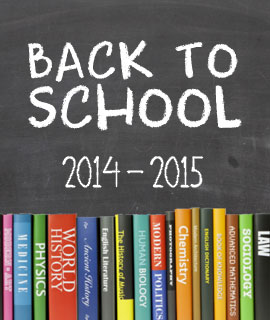Many students of all ages will be making the return back to school this month. Back to School preparation has likely already begun for many of you, and will continue on throughout the rest of the month. However, no matter how old you are or what educational institution you attend there is no better feeling for parents, kids and adult students than having all of the bases covered prior to the first day of school.
Completing the Health Checklist
Besides the usual purchase of school supplies and new clothes, be sure to schedule your student’s annual check-ups, which generally should include a physical, dentist visit and a comprehensive eye exam.
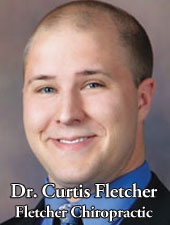 “The most important thing to have done in preparation for the new school year is a physical or wellness visit with your medical provider, whether it be a chiropractor or your general practitioner,” says Dr. Curtis Fletcher of Fletcher Chiropractic. “It is important to have a general check-up once a year to help prevent health issues from developing or if your child has current issues, to have them checked out regularly. If you see a chiropractor, they are able to check your child for spinal and joint problems such as scoliosis and other childhood joint issues that can develop. Early detection of these problems helps to correct the issue as your child grows and enters adulthood. It is also important to start your child on a regular schedule or routine a few weeks before school starts, so that they are prepared for the school day and are not tired or having trouble adjusting to the school schedule from being on summer break. Having a set schedule helps your child with their energy and staying alert during the school day.
“The most important thing to have done in preparation for the new school year is a physical or wellness visit with your medical provider, whether it be a chiropractor or your general practitioner,” says Dr. Curtis Fletcher of Fletcher Chiropractic. “It is important to have a general check-up once a year to help prevent health issues from developing or if your child has current issues, to have them checked out regularly. If you see a chiropractor, they are able to check your child for spinal and joint problems such as scoliosis and other childhood joint issues that can develop. Early detection of these problems helps to correct the issue as your child grows and enters adulthood. It is also important to start your child on a regular schedule or routine a few weeks before school starts, so that they are prepared for the school day and are not tired or having trouble adjusting to the school schedule from being on summer break. Having a set schedule helps your child with their energy and staying alert during the school day.
My advice for parents with children going back to school is to talk to your child about their posture and the position of their backpacks when carrying them. The correct position for a backpack is when the bottom of the backpack is resting in curve of their lower back. It is also important that they wear both straps and that the straps are adjusted to be comfortable for your child. Padded straps may be more comfortable. When one strap is worn, your child can develop muscle spasms in their lower back and neck due to the unbalanced weight. The backpack also should not weight more than 5-10% of your child’s body weight. If they are carrying around too many books and extra weight, children start to lean forward and their posture begins to change. When not wearing the backpack, posture during the school day is very important. Talking to your child about sitting up while in class and not slouching will help them with their energy and attention span in class. Correct posture when growing up makes for a healthier adult with less chance of having neck and back pain as they grow up. Finally, make sure your child eats a nutritional breakfast. This is the best way to provide your child with enough energy to get through the morning. Protein is very important to eat in the morning because it keeps you fueled up for many hours, whereas quick sugary foods may only last a few hours.”
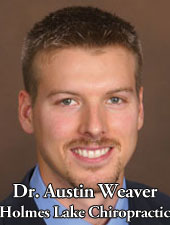 Austin Weaver, DC, owner of Holmes Lake Chiropractic, adds, “Have you thought about how much sitting your kids do at school? Some of them are seated for hours on end; that alone can be bad enough for the spine and circulation, but poor posture can also be damaging. A great way to improve seating posture is to remember to keep the ears over the shoulder, the shoulders over the hips, and a curve in both the neck and the lower back.
Austin Weaver, DC, owner of Holmes Lake Chiropractic, adds, “Have you thought about how much sitting your kids do at school? Some of them are seated for hours on end; that alone can be bad enough for the spine and circulation, but poor posture can also be damaging. A great way to improve seating posture is to remember to keep the ears over the shoulder, the shoulders over the hips, and a curve in both the neck and the lower back.
Many things have the potential to affect your child’s health or exacerbate an existing problem, such as if your child has sustained an injury over the summer or spent too much time in front of the television, and into the school year when they are carrying heavy books or the daily wear of after-school sports. A chiropractic check-up will ensure that they are in great alignment and free from discomfort before they start their rigorous school year; a sound body supports a sound mind.”
Recent studies have shown that the sooner children begin receiving regular check-ups, the healthier their mouths will be throughout their lives. Early childhood check-ups are essential in preventing tooth decay, which leads to pain, difficulty eating, and other medical issues. The American Dental Association recommends that every child should visit the dentist by age 1, or as soon as their first tooth appears. According to a study by the Center for Disease Control, the number of cavities found in children between the ages of two and five has increased 15 percent over the last five years. More than 40 percent of kids today have tooth decay by the time they start kindergarten. Kids should eat a balanced diet that naturally supplies all the nutrients they need to grow. Kids need a balanced healthy diet for their teeth and gums to develop properly.
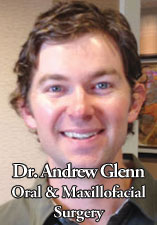 Dr. Andrew Glenn offers the following tips to promote good oral hygiene for your child:
Dr. Andrew Glenn offers the following tips to promote good oral hygiene for your child:
• Brush with fluoride toothpaste. If your child is under age 7, use only a pea-sized amount on their toothbrush. It may help prevent cavities.
• Make brushing teeth a fun activity by making up a song or dance.
• Pack healthy snacks such as carrots or celery rather than foods high in sugar content.
• Buy flavored floss to make it more appealing to your child
• Teach your kids not to fear the dentist. Visit your family dentist at least twice a year for regular cleanings.
Remembering to brush and floss your teeth at least twice a day is just as important for children as it is for adults. Turning good dental practices into habits early can help avoid problems such as cavities and gum disease down the road. Good oral hygiene can help ward off bad bacteria that causes gum disease and cavities in children, and can positively impact your child’s overall health. A visit to the dentist in preparation to return to the classroom ensures that your child’s education and development won’t be interrupted by oral health problems.
Whether your child is starting Kindergarten or high school, it’s wise to add an eye exam to your Back-to-School checklist! The eyes continue to develop throughout childhood. You may wonder if your preschooler has a vision problem. Early eye exams are critical to ensure that children have normal, healthy vision so that they can perform better in school as well as at play.
Good vision is an essential part of learning.
Early detection of vision problems is crucial because the younger a child is treated, the better the chance of responding to treatment. This is why the state of Nebraska requires an eye exam before beginning Kindergarten.
Did your teenager have a recent growth spurt? Eye and vision system development are complete by the time people reach their early 20s and normally remain steady for several decades afterward. If your teenager is going through a growth spurt, it’s a good time to have his/her eyes tested to see if there have been changes in eyesight as well.
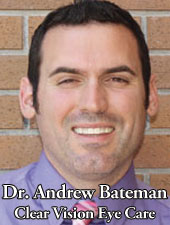 Dr. Andrew Bateman of Clear Vision Eye Care states, “Annual eye examinations are important because hidden vision problems or disorders may be detected. Eye safety is also important to remember during the teen years, as sports involvement and contact lens use become popular. We’re keeping an eye on your eyes!”
Dr. Andrew Bateman of Clear Vision Eye Care states, “Annual eye examinations are important because hidden vision problems or disorders may be detected. Eye safety is also important to remember during the teen years, as sports involvement and contact lens use become popular. We’re keeping an eye on your eyes!”
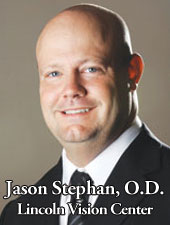 Jason Stephan, O.D., one of the seven highly qualified and experienced ophthalmologists at Lincoln Vision Center, offers several things to include on your Back to School checklist. “For those kids who wear glasses or contact lenses, be sure to have an updated prescription so your student starts off the year seeing their best,” advises Dr. Stephan. “Also, more sports-related eye injuries are happening so be sure your kid has protective eyewear such as sports goggles or polycarbonate lenses in their glasses. And always have a back-up pair of glasses or contacts for those unexpected accidents.”
Jason Stephan, O.D., one of the seven highly qualified and experienced ophthalmologists at Lincoln Vision Center, offers several things to include on your Back to School checklist. “For those kids who wear glasses or contact lenses, be sure to have an updated prescription so your student starts off the year seeing their best,” advises Dr. Stephan. “Also, more sports-related eye injuries are happening so be sure your kid has protective eyewear such as sports goggles or polycarbonate lenses in their glasses. And always have a back-up pair of glasses or contacts for those unexpected accidents.”
According to Dr. Stephan, parents should be aware of the warning signs of vision problems in kids:
1. Consistently sitting too close to the TV or holding a book too close
2. Losing his place while reading or using a finger to guide his eyes when reading
3. Squinting or tilting the head to see better
4. Frequent eye rubbing
5. Sensitivity to light and/or excessive tearing
6. Closing one eye to read, watch TV or see better
7. Avoiding activities which require near vision, such as reading or homework, or distance vision, such as participating in sports or other recreational activities
8. Complaining of headaches or tired eyes
9. Avoiding using a computer because it “hurts his/her eyes”
10. Receiving lower grades than usual
He continues, “Students with uncorrected vision conditions or eye health problems face many barriers in life … academically … socially … and athletically. The longer a vision problem goes undiagnosed and untreated, the more a child’s brain learns to accommodate the vision problem. That’s why a comprehensive eye examination is so important for children. Furthermore, remind your children to rest their eyes periodically, particularly when reading, working on a computer, or watching television in order to help them avoid eye strain and fatigue. For maintaining healthy vision, it is also very important to get plenty of rest, drink 6-8 glasses of water a day and eat lots of fresh fruits and vegetables.”
Little Learners
This fall, many will go back to school but a lot of younger children will be going to school for the first time. And that doesn’t usually mean kindergarten these days. A majority of parents are getting their kids involved in a classroom environment where they are learning and socially engaged at a very early age—even as infants! Dawn Robinson M. Ed, Director of World of Knowledge Child Development Center and Preschool, explains, “Here at World of Knowledge, we start working with the Early Learning Guidelines at age 6 weeks. We start our sign language program at age 6 weeks and our preschool program starts at age 1. We use individual assessments to help the teachers develop their curriculum around the needs of the child. As they become age 3-5, we follow the Nebraska State Standards for Kindergarten which helps us to prepare each child for school on an educational, social, emotional, and developmental level. We continue with learning through our school-age summer program which still incorporates fun as well as education throughout the entire summer. During the summer we also offer Soccer, Dance and Cheer clinics, Music class, and Jump bunch. Our school-age summer program consists of four field trips a week which includes both educational field trips such as Tree Adventure, Homestead National Monument, to go along with our theme units as well as fun field trips such as roller skating, mini golf, and bowling. We also get involved with the summer reading program with the Lincoln City Libraries. One of the major advantages of our program is that all of our classrooms are very structured with educational based curriculum from 6 weeks up to age 12 years. During the school year, we have homework club where we work with children on their homework, which helps to free up time in the evening at home so that families can focus on being together in the evening instead of having to work on homework. We also use a character building curriculum throughout the school year and summer to help strengthen children’s interaction and social skills which will help them throughout their adult life.”
She advises, “For kids that will be going back to school, I always tell parents to try and establish a bedtime routine two weeks before school starts that way it won’t become such a shock when they have to start going to bed earlier. If you have a child who will be entering kindergarten, and they are still taking some sort of nap, make sure to slowly take their nap time away so that their bodies get used to going to school all day. Also, help your child become or stay independent by giving them chores to do around the house, which will support their routine when transitioning back to school.”
Extracurricular Activities – Staying Active and Engaged
At the same time that kids are returning to school, they are also beginning or returning to their after school routine, including extracurricular activities.
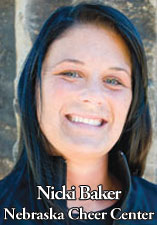 Nicki Baker, owner of Nebraska Cheer Center, says, “As the new school year begins, keep in mind that the best way to keep your child on track and focused is to keep him or her active outside of the home. Children who exercise and are involved in activities are much more successful in life and in school. At an early age, children who are encouraged to take part in sports of any kind learn the value of commitment, teamwork, goal making, and so on. We highly recommend getting your child involved in an activity, and we would be thrilled to welcome them into the Nebraska Cheer Center Cheer & Tumbling Program family. At NCC, we strive to be a positive, fun, safe, and family oriented environment where children can play, learn, and grow up to become strong leaders in our community!
Nicki Baker, owner of Nebraska Cheer Center, says, “As the new school year begins, keep in mind that the best way to keep your child on track and focused is to keep him or her active outside of the home. Children who exercise and are involved in activities are much more successful in life and in school. At an early age, children who are encouraged to take part in sports of any kind learn the value of commitment, teamwork, goal making, and so on. We highly recommend getting your child involved in an activity, and we would be thrilled to welcome them into the Nebraska Cheer Center Cheer & Tumbling Program family. At NCC, we strive to be a positive, fun, safe, and family oriented environment where children can play, learn, and grow up to become strong leaders in our community!
Nebraska Cheer Center offers several classes for children ages 3 to 18 years old! Classes include Tumbling, Flexibility, Strength and Conditioning, Stunting, and Recreational Cheerleading for the beginner athlete through advanced. Nebraska Cheer Center also hosts Tumbling, Stunting, and High School Cheer Prep clinics throughout the year! Recreational Cheerleading is perfect for athletes who are interested in learning cheer motions, jumps, dances, and stunts ‘just for fun’ in a safe, positive atmosphere under the instruction of fantastic friendly and loving coaches. NCC’s Tumbling Program consists of classes for those learning forward rolls through elite level tumbling passes with safe and proper technique and progression through each level and skill. Nebraska Cheer Center offers Tiny Tumbling for our community’s littlest athletes, ages 2-5 years. Tiny Tumbling classes are 30 minutes of forward rolling, skipping, jumping, and cartwheeling fun as the athletes work on strength, flexibility, and coordination in an obstacle course of mats, trampoline, and tumbling structures. Our Coaching staff is safety certified, talented, and highly experienced. Their main goal is to make sure each athlete is excelling and enjoying the time they spend in our facility. Being a part of Nebraska Cheer Center will teach your child the importance of maintaining a healthy active lifestyle, will ensure they begin to develop a positive body image, and will give them confidence to create and reach personal and team goals. For those who are interested in enrolling in two classes at Nebraska Cheer Center, their second class is 50% off the regular price!”
She adds, “We realize that there are different youth activity options here in town; however, we encourage you to stop by Nebraska Cheer Center to see firsthand why we are different from the rest. Our coaches are a very special and intricate part of our program. They were each selected to be a part of our staff because of their caring nature and their interest in bettering the lives of children through the sports of cheer & tumbling. Your child will surely not be only a number filling our class rosters. We strive to know each child by their name, learn their hobbies, are interested in their personal wellbeing, and want them to enjoy every minute they spend in our facility!”
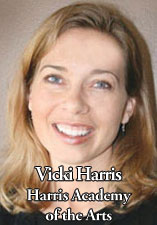 Vicki Harris, owner of Harris Academy of the Arts, also offers some ways that music can benefit students of all ages. “Music is a wonderful outlet, and in terms of importance, it is right up there with other after school activities! Benefits of music lessons and classes include bettering the wellbeing of all three branches of health: mental, emotional, and physical. Participation in music is known to increase confidence, provide a creative outlet, and cultivate a sense of community–all important benefits for any age. Harris Academy of the Arts offers private lessons and group classes for 15 individual instruments including piano, voice, guitar, strings, woodwinds, brass, percussion, and theatre. Whether a student is taking a private lesson or in a group class, and to further improve skills or for his or her own enjoyment, you can be sure all of our students benefit greatly from the activities offered at Harris Academy of the Arts.
Vicki Harris, owner of Harris Academy of the Arts, also offers some ways that music can benefit students of all ages. “Music is a wonderful outlet, and in terms of importance, it is right up there with other after school activities! Benefits of music lessons and classes include bettering the wellbeing of all three branches of health: mental, emotional, and physical. Participation in music is known to increase confidence, provide a creative outlet, and cultivate a sense of community–all important benefits for any age. Harris Academy of the Arts offers private lessons and group classes for 15 individual instruments including piano, voice, guitar, strings, woodwinds, brass, percussion, and theatre. Whether a student is taking a private lesson or in a group class, and to further improve skills or for his or her own enjoyment, you can be sure all of our students benefit greatly from the activities offered at Harris Academy of the Arts.
Extracurricular activities are a crucial part in a student’s life throughout the school year. They work as a stress relief, a fun activity, a learning experience, and much more. Students both need and deserve to have learning experiences outside of a traditional classroom setting, so they have a well-rounded education and can better learn what interests them for their future. Based on our expertise, we offer the following advice: If you’re thinking about music lessons or classes now, then follow through today! We offer introductory lessons and free group class previews. Schedules fill fast, so don’t procrastinate!”
New School Year, New Wardrobe!
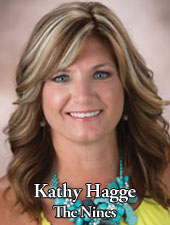 For many, one of the best parts of going back to school is getting brand new stuff! Furthermore, as the saying goes, “you don’t get a second chance to make a first impression.” The Nines is a new boutique in Fallbrook that offers unique clothing and flattering styles for college students of all ages. Many items are both stylish and comfortable, which is important for the long days in the classroom and then on to duties at work and home. But just because the day demands clothing that is cozy and relaxed doesn’t mean you need to sacrifice fashion! This fall, The Nines will carry many items that are trending such as capes and clothing that drapes well, which are very flattering, as well as bold patterns and fun styles such as prints that feature animals and birds, geometrical designs, and pops of color. Kathy Hagge, owner of The Nines, offers the following advice for women who are shopping for their back to school wardrobe:
For many, one of the best parts of going back to school is getting brand new stuff! Furthermore, as the saying goes, “you don’t get a second chance to make a first impression.” The Nines is a new boutique in Fallbrook that offers unique clothing and flattering styles for college students of all ages. Many items are both stylish and comfortable, which is important for the long days in the classroom and then on to duties at work and home. But just because the day demands clothing that is cozy and relaxed doesn’t mean you need to sacrifice fashion! This fall, The Nines will carry many items that are trending such as capes and clothing that drapes well, which are very flattering, as well as bold patterns and fun styles such as prints that feature animals and birds, geometrical designs, and pops of color. Kathy Hagge, owner of The Nines, offers the following advice for women who are shopping for their back to school wardrobe:
“There are many ways to make the fall trends this year work for you. The Nines offers plenty of basic pieces that are perfect for mixing and matching, which is essential for ladies who want to create a lot of different looks on a budget. My favorite items are the dresses and longer shirts that you can pair with different vests, scarves, accessories, leggings, and shoes (boots, flats, or heels) to create a variety of completely different looks that transition from casual to professional and day to evening. This works especially well with leggings, as there are plenty of bright colors and wild prints to choose from. By covering up most of the leg with boots and a longer dress or skirt, you only leave a pop of color or print just to be different and eye catching but not over-the-top.
To me, regardless of who you are, you have to be comfortable in your clothes. It doesn’t matter if someone else says they like it or if it is on trend; if it doesn’t fit you right or you’re not comfortable in it, you’re not going to like it. If you feel good in it, you’re going to wear it. Don’t get suckered into something that’s not your style, but do try to take a few chances. The shopping experience is the same way, so make sure you visit places that make you feel comfortable and where you can make your own decision without someone being pushy.
We really take pride in being a place that offers key pieces that give you more bang for your buck because you will never look like you’re wearing the same thing. Also, as we carry a limited number of the same item, you won’t be wearing the same thing as anyone else either! However, combining items to create a full outfit can be tricky so we will be offering wine nights to showcase some of the ways you can mix and match items on real women who will be modeling them. That way, you will not only get some new ideas but also find out what something will look like before you make the investment and venture out of your comfort zone. The Nines is a fun, casual place to shop so there won’t be any salespeople bothering you, but all customers are welcome to ask for help or advice.”
Finding a unique look that suits your lifestyle and personality is just as important for the guys as it is for the ladies! Precision Skateboards is a great place for high quality, durable shoes and apparel from a wide variety of specialty brands that you can’t find anywhere else in town. Furthermore, Precision Skateboards and The Bay are both excellent local resources if you have a young one who might be interested in skateboarding—or for skateboarding enthusiasts of all ages and skill levels!
Senior Photos
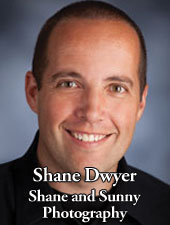 Your senior year in high school is definitely an unforgettable milestone, and senior photos capture young adults during this central moment in their life. Shane Dwyer of Shane & Sunny Photography advises, “Depending on your schedule, there are benefits to scheduling your photos session during the summer or the fall. A lot of the timing is determined by the school’s yearbook deadline and the activities that the senior is involved in. What to wear is also a frequent concern, and will likely change a bit with the season. The main thing is that you wear clothes that you like and are comfortable in, but also avoid large patterns as they can be very distracting and if you are wearing multiple outfits make sure they are all in a different color and style.
Your senior year in high school is definitely an unforgettable milestone, and senior photos capture young adults during this central moment in their life. Shane Dwyer of Shane & Sunny Photography advises, “Depending on your schedule, there are benefits to scheduling your photos session during the summer or the fall. A lot of the timing is determined by the school’s yearbook deadline and the activities that the senior is involved in. What to wear is also a frequent concern, and will likely change a bit with the season. The main thing is that you wear clothes that you like and are comfortable in, but also avoid large patterns as they can be very distracting and if you are wearing multiple outfits make sure they are all in a different color and style.
We always suggest that you go in and meet the photographer before you book the appointment. You need to feel comfortable with the photographer or your images will show it! Sunny and I are both trained photographers and we have over 30 years of combined experience, as well as a professional studio with a dressing room so you don’t have to change in the car or on the fly. There are a lot of photographers out there and most are very different in style and in what they offer. Be sure to check out at least two photographers to make sure that you are getting what you want.”
Technology in the Classroom
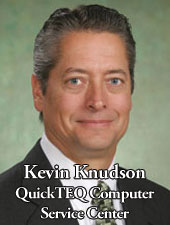 Kevin Knudson, owner of QuickTEQ Computer Service Center, offers tips on finding the right technology for the 2014-15 school year:
Kevin Knudson, owner of QuickTEQ Computer Service Center, offers tips on finding the right technology for the 2014-15 school year:
“Back to UNL for my youngest of four, Ryan, who will be starting his sophomore year at UNL. Ryan recently asked me, ‘Dad I had a laptop and a tablet last year, is there anything NEW this year that I should upgrade to or buy?’ Students this year will really enjoy the new touch screens on laptops and all-in-one computers. Everyone is getting used to their smart phones and touch screens, so a lot more computers now come with touch screens. An all-in-one is like a desktop/laptop, with a 20+-inch touch screen. It fully functions as a desktop, but more portable. QuickTEQ still offers the Windows 7 operating system and of course Windows 8, which is greatly improved with its newest desktop feature.
Phones have become almost a replacement for tablets. Smartphones are more common than ever, and they have replaced a lot of our time on a computer. Also, laptops have been newly designed with touch screens. The advantage is still with full size keyboards and screens, which seem to be preferred for term papers and general homework. Laptops come in all sizes from tablet size to 17-inch generally; 15.6 inch is the most common and most affordable laptop for what you get. Computers now store more and more in the cloud using new companies like DropBox. Storing and accessing your work, pictures or general files now can be accessed from almost any device as long as you can connect up with the internet and it has a browser.
Monthly subscriptions for software are now more common. Software companies like Microsoft and Adobe now produce their solutions bundled with a monthly fee instead of buying software. This allows you to access and use Office and other software from any device; you just need to remember your login and password.
Now SECURITY is the new buzz word. People are doing more banking, bill paying and shopping online more than ever before. QuickTEQ offers firewalls and security software and all of our techs educate everyone that shops with us about the risks of just logging into the Internet. AVG Cloud care has really stepped up their game for protection. We offer remote support, backup and security solutions.
QuickTEQ, also known as QTEQ, has consolidated into one store located at 330 N. 48th Street, and we are open until 8 p.m. every day of the week offering full retail and quick repair. We sell laptops, re-certified from $195 to $300 and open box and new starting around $350, and also accept trade-ins.”
How Technology is Keeping Your Kids Safe in School
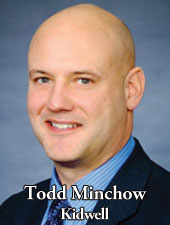 With the outbreak of violence in schools in recent years, many parents are concerned about the safety of public schools. This is one area that technology is improving for the future. Kidwell has partnered with schools in Lincoln and Omaha to provide video surveillance and access control systems, which are already being utilized in many of our local schools. Todd Minchow, Vice President of Technology at Kidwell, explains, “Many parents are asking school administrators and educators the question: ‘What are you doing to make schools a safer place?’” This is an answer. We are installing systems that allow staff to monitor who is approaching the building and to control who gains access, intercom systems for communication in the case of an emergency, and cameras that offer enhanced visibility for the ability to monitor all areas of the building and grounds. Aside from preventing mischief, cameras also give visibility to fire, rescue and police teams in the event of a lockdown or emergency. The systems we implement can also be remotely accessed from an iPad or laptop, so the school representative has the ability to give law enforcement or other officials mobile access to video throughout the school system.”
With the outbreak of violence in schools in recent years, many parents are concerned about the safety of public schools. This is one area that technology is improving for the future. Kidwell has partnered with schools in Lincoln and Omaha to provide video surveillance and access control systems, which are already being utilized in many of our local schools. Todd Minchow, Vice President of Technology at Kidwell, explains, “Many parents are asking school administrators and educators the question: ‘What are you doing to make schools a safer place?’” This is an answer. We are installing systems that allow staff to monitor who is approaching the building and to control who gains access, intercom systems for communication in the case of an emergency, and cameras that offer enhanced visibility for the ability to monitor all areas of the building and grounds. Aside from preventing mischief, cameras also give visibility to fire, rescue and police teams in the event of a lockdown or emergency. The systems we implement can also be remotely accessed from an iPad or laptop, so the school representative has the ability to give law enforcement or other officials mobile access to video throughout the school system.”
He adds, “I think it’s important for parents to be aware that this technology is available for schools. Everyone wants their child to be safe, so don’t shy away from voicing your opinions and encouraging your child’s school to pursue incorporating this technology. Funding is available for these types of systems in schools through government grants, especially with the tragic events that have transpired recently. Furthermore, one of the best things about technology for the consumer is that as technology is enhanced, the price comes down. Now there are higher end cameras that are available for much less money that what you would have been looking at even three years ago. The capabilities of cameras have increased exponentially, and they have the ability to pan, tilt, zoom, cover a complete 360 degrees, and in some cases even track an object.
In addition to video surveillance and access systems, we are also seeing many school systems that are enhancing their WiFi environment. There is government funding for this type of endeavor as well. At Kidwell, we partner with a local company that specifically assists schools and non-profit organizations with finding and obtaining funding through special E-Rate grants, which provides funding specifically for technology. We connect our clients with this company, which will assist them with applying so that they don’t have to go through the process of paperwork alone, which can be confusing and quite daunting for administration. Another area we find that schools have difficulty with is managing the systems once they are implemented. We also work with local partner companies and vendors on funding for cloud-based services. This moves the management from the schools to the outside company, which manages the WiFi environment of the school through a hosted service in the cloud. The school still has a portal to control things, but if there is a problem or if an access point goes bad, the system automatically dispatches the company and takes the entire burden off of the school staff.”
Returning to the Classroom at Any Age
You can be a student going back to school at any age. For adult learners, there are different aspects of life to consider when deciding to juggle school along with many other responsibilities. The good news is that there are programs specifically designed for non-traditional students which take this into consideration.
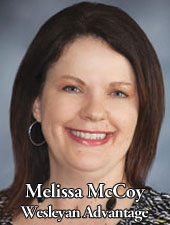 “The adult programs at Nebraska Wesleyan are set up specifically for people who are juggling work and family obligations but want to get a degree from a respected institution,” states Melissa McCoy, Director of Wesleyan Advantage in Lincoln. “Our programs are rigorous and provide life-changing experiences but do so in a way that is manageable for people who have busy lives outside of school. Classes meet one night a week for five or eight weeks at a time. Many of the classes are online or partially online (hybrid) so students get to interact with faculty and classmates but also enjoy a certain amount of flexibility. People are also surprised at how affordable our adult programs are; we are often less expensive than other schools they are considering.”
“The adult programs at Nebraska Wesleyan are set up specifically for people who are juggling work and family obligations but want to get a degree from a respected institution,” states Melissa McCoy, Director of Wesleyan Advantage in Lincoln. “Our programs are rigorous and provide life-changing experiences but do so in a way that is manageable for people who have busy lives outside of school. Classes meet one night a week for five or eight weeks at a time. Many of the classes are online or partially online (hybrid) so students get to interact with faculty and classmates but also enjoy a certain amount of flexibility. People are also surprised at how affordable our adult programs are; we are often less expensive than other schools they are considering.”
McCoy advises, “If you are considering going back to school, know that you have many options. Do your research and talk to several schools. Find out what their reputation is in the area of study that interests you. Ask people you know, especially employers, for recommendations about degrees that are respected and will make an impact on your resume and career. And never make assumptions about a school without talking to a representative of the institution. When you select a school, you are making a decision that will have lasting impact on your career and your finances. Get all the information you can before you make a commitment.”
She adds, “Over the years, I’ve learned that many adult students are nervous about returning to school. Even when they gather the courage to enroll, they wonder – ‘Can I do this? Will I have time to study? Am I smart enough? How will this affect my family?’ Please know that everyone asks these questions and has these anxieties. Most students find that it doesn’t take long for their nerves to calm down and for them to get into the rhythm of being a student. If getting your degree is something you want to do, believe in yourself and go after it!”
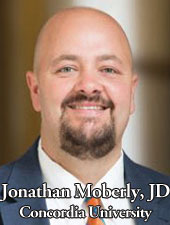 Jonathan Moberly, JD, MBA Program Director at Concordia University, adds, “At Concordia University, Nebraska, excellent, practical academics intersect with a Christian community and values.
Jonathan Moberly, JD, MBA Program Director at Concordia University, adds, “At Concordia University, Nebraska, excellent, practical academics intersect with a Christian community and values.
Our MBA program has been designed by business industry leaders to provide students with a foundation of knowledge to help them both advance to a leadership role within an organization and have the ability to make decisions in that role that will lead to the organization’s success. This foundation is built by providing students with a relevant curriculum that truly makes sense in today’s changing business environment. The instructors and administration of the MBA program at Concordia University, Nebraska are dedicated to building a strong and professional relationship with every student to assure not only the student’s growth as an industry professional, but also that the program meets the student’s needs.”
Moberly advises, “I was out of school for several years until I chose to go back to pursue my MBA. Some thoughts that helped me as I began that same journey, and what I tell students who are new to the Concordia MBA program, are to keep your eyes on the prize and focus on applying to what you know. Every course you take in the Concordia MBA program can be applied somehow to your current career or one that you want to pursue; if you apply the material to situations and roles that you know, it will be much more rewarding.
Making the decision to return to the classroom is not an easy one, especially if you now have a family, a job, or both. As such, we want you to be happy with that decision and are committed to delivering a curriculum that is of the highest quality and instructors to deliver that curriculum who are engaging and bring a wealth of real world experience.”
“For post-secondary students of all ages, make sure to take advantage of resources!” Kat Kreikemeier of Southeast Community College emphasizes. “Colleges and universities have a number of resources available, often at no additional cost, that are in place to help students succeed. Most colleges have professionals that are responsible for offering or coordinating tutoring, advising, career counseling, campus activities, financial aid, job search assistance, etc. Don’t be afraid to ask questions (and ask them early—before it’s too late) of these individuals—they want to help students!
There are a variety of reasons why individuals interested in post-secondary education should consider SCC: hands-on learning opportunities, small classes and excellent equipment (technology) and facilities. However, most important is that SCC offers an excellent education that prepares students for the workforce. SCC has an incredible graduate employment/transfer rate (94 percent), and the quality education is delivered at an impressive value. The quality of SCC’s programs is second to none, and local employers know that. Education of any kind is an investment in oneself, and an SCC education creates long-term benefits for the student, their family and the larger economy.”
We wish all of our readers the best of luck with the first day of school, as well as with all of the necessary preparation that takes place beforehand. And as always, we encourage everyone to utilize local resources with all of your Back to School needs!

